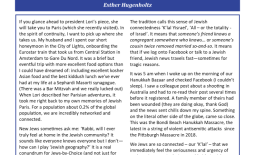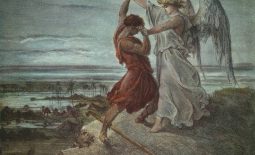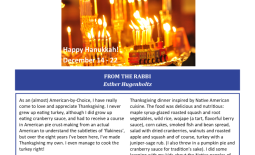The Jewish Story Worth Telling
I was relaxing on my day off with my iPad when I clicked on the embedded YouTube video. A beautiful rendition of ancient Israel sprang to life. Jews dressed in simple, homespun robes. A woman and her husband traveling. She is heavily pregnant and they have to rest for the night but all the inns are full. They bed down in the barn and through the agonizing pangs of labour and the life-giving hope of deliverance, a child is born…
You know the rest of this story.
This was on a Christian website of course, and this carefully, historically-imagined mini-movie was effectively executed. The emotions of the parents, the shepherds and Wise Men. Yearning, hope, love, surrender, devotion, redemption. A repository of shared, human, universal emotions that we feel keenly and even more so in the dark days between Delta and Omicron. And I will confess that I felt a tear rolling down my cheek.
Not to worry: the rabbi is not going soft on Jesus, chas v’sholem (God forbid). I never had any pre-existing attachments to Christianity before I entered the Jewish community, having been raised by proud secular humanists. And I want to emphasize that it wasn’t the alleged divine claims of the story that pulled me in. On the contrary, it was the human elements that proved profoundly moving. We can and are allowed to feel the soul-stirring pull of another tradition’s sacred magnetism even if we are fiercely loyal to and in love with our own. In fact, this sacred magnetism is something visiting Christians routinely experience when they visit synagogues and Judaism has a long, proud history of exuding our own sacred magnetism.
This interfaith pull that we can feel between religious traditions is something that religious scholars call ‘sacred envy’ and seminarians of all stripes use it to our advantage, to hone us in our training and to foster our religious creativity and leadership. I remember attending interfaith conferences between Muslims, Jews and Christians when I was in rabbinical school and we would all sit together, in a spirit of generosity, and reflect on what we admired about the other traditions we got to experience. Sacred envy, then, is not something to be feared but welcomed; not something to shut down but contextualize. We see ourselves so much more clearly through the eyes of others.
Congregant Naomi Greyser wrote a stunning and thought-provoking piece illustrating her encounter with sacred magnetism and sacred envy. Her piece was recently published in the Los Angeles Review of Books even though it recounts a pre-pandemic encounter of 2019. She has given me permission to share and reflect on her article.
Naomi was taking a professional development course and part of her homework assignment was to observe a religious service from another faith tradition. She decided to visit our neighbors and friends from Sanctuary Church, an LGBT-affirming non-denominational congregation for their Christmas Eve service. She titled her experiences ‘O Night Divine: Observing Christianity’.
Naomi writes (I am quoting her words but have edited them for brevity):
“I had selected Sanctuary for my observation because it was an intentional community that welcomed congregants from all backgrounds. I had wanted to feel out the contours of inclusive Christianity, a phrase some are quick to dismiss as an oxymoron. My friend Christopher, who gave sermons here, reminded me that Sanctuary Church welcomed faith and doubt. I laughed because if most synagogues didn’t welcome doubt, how many people would show up?…
Growing up, my family used to tune the car radio to a holiday music channel and drive around, admiring lights and the living tableaux of families gathered around their trees. Now, as ushers lit candles down the aisles and congregants passed the flame down each pew, I saw myself inside the tableau… It felt magical, already a memory glimmering in the room. O night divine we sang, and tears came unexpectedly to my eyes. What was this? I paused, mid-verse, feeling out my deep desire to be a full part of this Christmas Eve, to let go of my observational distance and difference. O my God – I thought. Was I… jealous??…
Visiting this community threw into relief my minority religious identity… I think my yearning in that moment of swaying candlelight was also about unmitigated inclusiveness, something I have been taught is a seductive and even dangerous fantasy. And something that can be profoundly beautiful, as well.”
I encourage you all to read Naomi’s full piece which is linked in last week’s weekly email, and I invite you into private conversation with if you want to unpack its implications or impact on your sense of Jewishness or Jewish spirituality. The point of this sermon is not to talk about Jesus or Christianity. The point is, as we observe Shabbat, our weekly ‘holy night (and day)’, as it intersects with Christmas, to think about our place in a majority Christian world, our sense of belonging and the powerful stories we encounter: those of others and our own.
I thought hard about giving this sermon. I am cognizant that some of us may be here today to get away from Christmas, not hear about the ever-present Christian festival (secularized though it may be) from the bimah. A synagogue is our sacred space, a nexus of our Jewish belonging, where we can be Jewish, safe and free. At the same time, we cannot pretend that the hegemony of Christmas in our American world is affecting us too. So instead of turning inwards or assuming a position of defensiveness, I want to propose another approach.
Sit back and imagine the following:
Click on the video on the website. The YouTube link springs to life. We see an imagined-historical depiction of a mother in labor. She is in a slave hut, poor, destitute, but with a quiet strength and composure. As she contends with the sharp pangs of labor, she hopes for deliverance—for herself, her child and her people.
The baby is born, fragile and innocent. Lovingly swaddled, she nurses him at her breast but then knows what needs to be done. The wicker basket has been prepared and she gently lowers him into it. This is the hardest thing imaginable for any parent to do; to relinquish one’s own child. Hot tears run down her face and with desperation and grit, she prays to the ancient, invisible God her slave people believe in.
Her older daughter takes the basket from her mother’s arms. One last wail as she forces herself to turn away. In silence, slipping into the darkness, the daughter creeps to the banks of the river, praying the babe will not stir. She wades through the bulrushes to the edge of the water, the cold cutting through her thin, ragged dress. Willing herself to remain calm, she lowers the basket onto the gently lapping river, offering Moses to destiny and redemption.
The camera pans out. Eighty years later, a newly liberated people reach the Mount. Written upon their hearts, amongst thunder and lighting, fire and cloud, they are taught their master story: to overthrow Pharaohs and yoke themselves to justice and mercy.
Wow. What a story to tell. It is the story of this week’s Torah portion, when a family becomes a nation and the nation acquires a vision of its own redemption, and with that, the redemption of the world entire. This is our story and it is a magnificent, earth-shattering, heart-transforming, truth-to-power-speaking story that has served our People for millennia and bound us to each other, our concern for the world and to our God. It is a story that has sired songs of freedom the world over; that has enshrined inalienable human rights and taught a hungry humanity of a God Who loves the stranger, orphan and widow. It is a story that lifts souls and breaks chains.
On this Shabbat then, I encourage you to dig deeply, tune out the clutter of our frantic, panicking world and find your story—find your Jewish story; our Master Story that will bring us to the door of the Messianic Era. Naomi and I both saw that others can have a compelling story. And we can honor it; hold it, without relinquishing our own. The power of sacred envy is that we can cross-reference our stories and uncover the shared humanity at the base of them and return, each to our communities, with the revelation that we can both be unique and hold so much in common.
Whether you had Chinese food or not, whether you are in an interfaith family or not. Whether you once celebrated Christmas or perhaps still do, with family and friends—that is not the point. In the dark days of our current age, it is the stories of God and of liberated humans that give us continued hope. May we have the ‘zechut’, the merit, to continue to tell our Jewish story—to each other and to the world, and to do so with joy, resilience, generosity of spirit and an eternal, abiding, redemptive hope.
Shabbat shalom.




